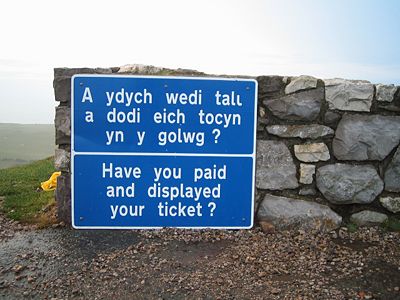Welsh language

Official signs in Wales must be bilingual, Welsh first. The Welsh Language Act 1993 encourages, but does not require, private companies and organisations to provide Welsh-language material alongside English.
The Welsh language is a Celtic language spoken mainly in Wales and one corner of Patagonia in Argentina. Like English, its roots can be traced to the Proto-Indo-European tongue once spoken across Europe and central Asia. It is more closely related to Irish and Scottish Gaelic, with its closest relative, Cornish, now extinct.
Today, about 20% of Welsh people identify themselves as Welsh speakers, and the popularity of the language is on the rise - a far cry from the nineteenth century, when children were often punished for speaking the language at school. Most speakers are found in North Wales, where the dialects are distinctly different from those spoken in South Wales. Though almost every speaker of Welsh is also bilingual with English, many older speakers in particular are more comfortable in Welsh. Their right to use the language is guaranteed by law, with all public bodies required to display bilingual signs and provide services in both languages. Private companies and organisations, however, are simply encouraged to provide Welsh language provision. Welsh English has been influenced by Welsh in matters of accent and, perhaps, grammar.
Grammar
The grammar of Welsh is relatively different from English: the verb is the first major constituent in the sentence by default, and there are masculine and feminine grammatical genders. The phonology, or sound system, differs significantly too: like Irish, consonants sometimes 'mutate', changing their form when in contact. For example, the initial consonant of carreg, meaning 'stone', changes in the phrase fy ngharreg 'my stone'.[1]
Welsh and English
The influence of one language on the other is more one-way than one might assume, given the proximity of England and Wales. Only a handful of Welsh words exist in English (e.g. druid), whereas Welsh has borrowed many loanwords from English. This reflects the differing origins and fortunes of previous generations: Welsh developed from older Celtic tongues, while the precursors to English came to Britain much later, brought by Germanic tribes from continental Europe, whose descendants came to dominate the islands.
Footnotes
- ↑ BBC Wales: 'Nasal mutation'.